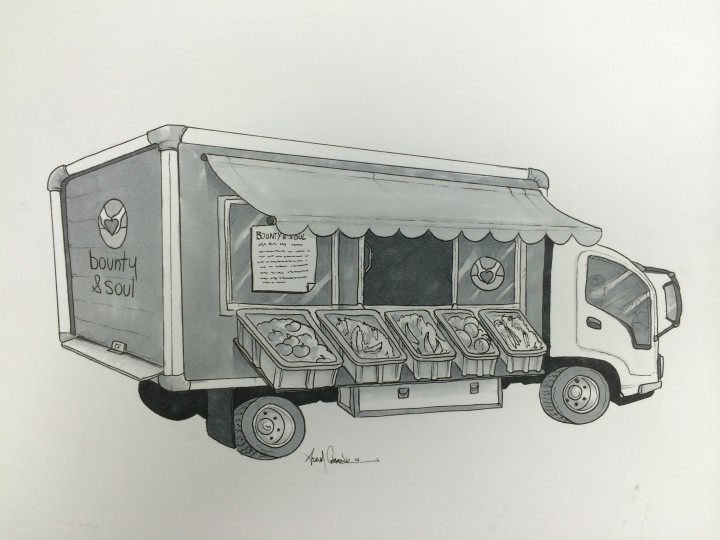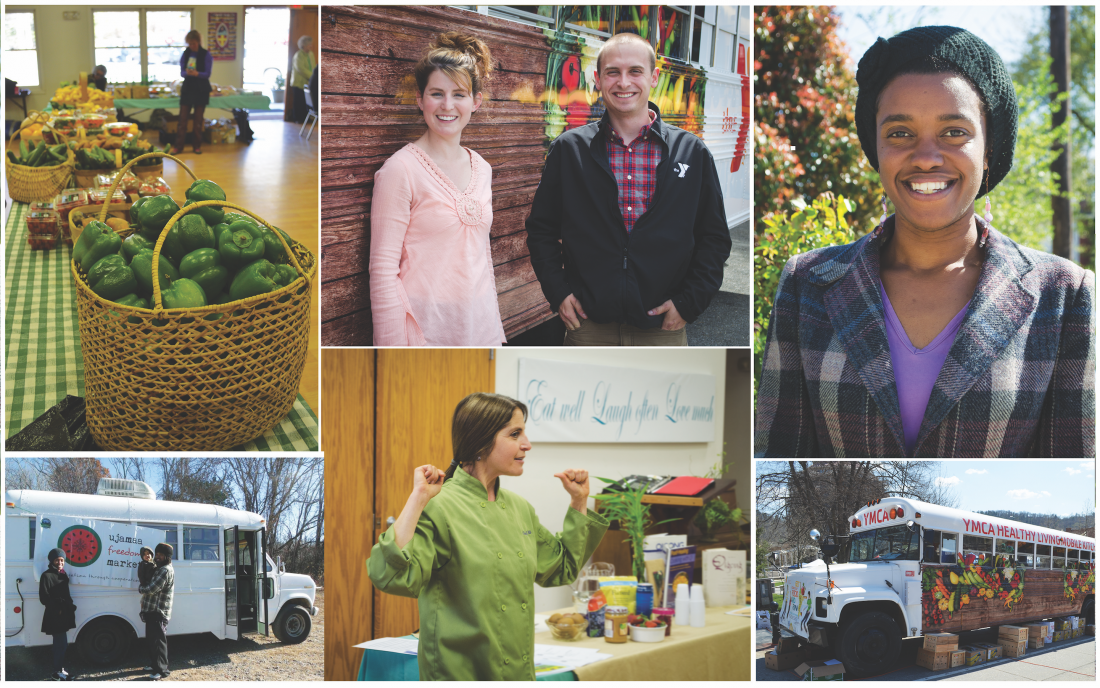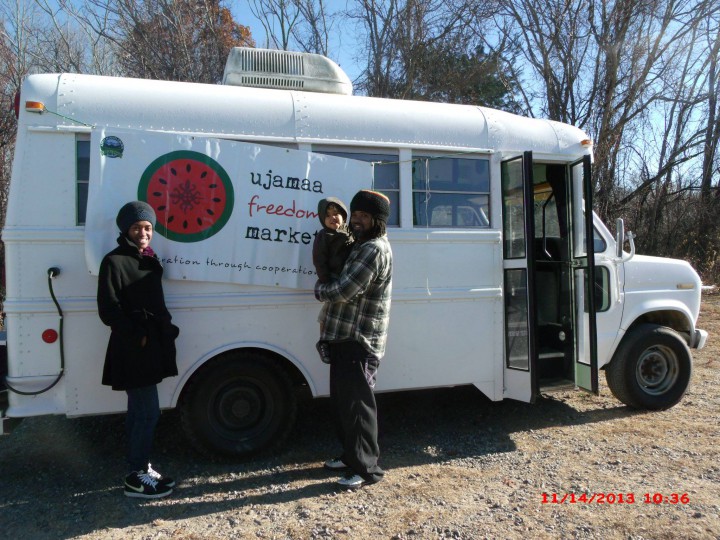“Food desert” may be a term you’ve heard a lot recently. The U.S. Department of Agriculture defines a food desert as an area without ready access to fresh, healthy and affordable food — and has flagged several broad areas in Western North Carolina, including areas within Asheville city limits.
In many ways, the WNC region is a perfect example of an area prone to food deserts. If you have a car, it’s not uncommon to drive several miles before you reach a grocery store. And if you don’t have a car, crossing the distance between where you live and where you shop for food on foot may be a tremendous challenge — especially for seniors, parents with young children or folks with disabilities. With this in mind, it may not be surprising that three different mobile food markets are aiming to launch this year — each taking a different approach, but each striving to reduce the distance between healthy foods and communities in need.
Connecting healthy kids

A former 72-passenger bus covered with brightly colored images of fruits and vegetables? The YMCA’s Healthy Living Mobile Kitchen is certainly hard to miss.
“We thought, why not go big?” says Cory Jackson, senior director of Youth and Community Development for the YMCA of WNC.
Jackson says the idea for the mobile kitchen came from a desire to expand on the services offered by the free pantry at the Beaverdam Youth Services Center. Through a grant from the WalMart Foundation, a bus from the Y fleet was converted into a full service kitchen allowing the Y staff to offer on-site free food, cooking demonstrations, nutrition education and food stamp assistance.
“The service we’re providing through the pantry is excellent, but we needed to bring in the nutrition education piece and reach those communities that are pretty far out,” Jackson says.
In order to find the areas where mobile services would be most effective, the program analyzed client data to see where Y services were already being used.
“Those clusters tell us that it is very easy for those families to get to us,” says Nicole Coston, the YMCA’s healthy living manager. “So we would want to be able to stretch out towards other areas like Henderson County, McDowell County, Jackson County — where families aren’t able to get to us as easily, due to transportation concerns or just the time it would take.”
The bus will also offer local produce from community gardens, including the one tended by kids at the Youth Services Center.
“The kids here will be able to plant the seeds, tend the garden, harvest and then see where it goes,” Jackson says. “It provides that teaching moment for our kids here to be able to see how they are helping their community.”
For now the bus will concentrate on visiting YMCA after school and summer camp locations, though the goal is to expand the reach once staffing and resources can assure a consistent presence.
“What we don’t want to do is go to a location and then not come back for a month,” Jackson says. “We want to make this as regular as possible.”
In the future, Coston and Jackson say they would like to use the bus to increase access to other Y programs, including obesity and diabetes prevention.
“There’s a lot of ways we can take this and we want the community to embrace it,” Jackson adds. “We’re excited to see where it goes.”
For more information about the YMCA’s Healthy Living Mobile Kitchen, visit facebook.com/ymcawnc.
Liberation through cooperation
Healthy foods may not be the only things a mobile market can bring to a community. According to Olufemi Lewis and Calvin Allen, co-owners of Ujamaa Freedom Market, a mobile market can also be a source of empowerment.
“We want to show people that they can lift themselves while doing something that will benefit the community and benefit themselves at the same time,” Lewis says.
The idea of Ujamaa began when Lewis and other women who lived in public and low-income housing in Asheville became concerned about the lack of healthy foods available in their communities. Lewis says that a mobile convenience store would visit her neighborhood, selling “any kind of candy or processed junk food you wanted,” but fruits, vegetables and healthy snacks were never peddled.
The new mobile market is designed to change that. Ujamaa will bring produce, free-range organic eggs and premade sandwiches, as well as cooking demonstrations, nutritional information and books on self-empowerment and improvement, Lewis says. The market won’t be exclusively organic, in part out of a need to stay affordable, though it will label GMO foods as a way to increase education and allow for choices.
“Right now the most important thing is the introduction to cooking and eating healthy,” Lewis says. “You can’t go into a low-income community and insist that everything be organic. We want to meet the community where they’re at and provide a mixture of things, including education.”
Lewis and Allen have previously run Ujamaa as a pop-up market on Depot Street, but after launching a campaign on GoFundMe and receiving a loan as part of the Community Development Block Grant, Lewis and Allen purchased a bus, which they will begin taking to Asheville Housing Authority communities and mixed-income areas such as Montford, Oakley and Emma starting in May.
Ujamma differs from other mobile markets in a key way: this endeavor isn’t grant funded and the food isn’t free, Lewis says. Having gone through the experience of being rejected for grants or receiving grants and watching them run out, Lewis and Allen decided on a different model: a cooperative-based, worked-owned business tied to a symbiotic relationship with its employees and the community it serves, funded through the sale of its products and community donations.
“The idea is to be a model for individuals that look like us and come from similar backgrounds,” says Lewis. “We want to show that if you’re not accepted in the institutions that are out there, then you can create something new that is your own and supports you and that you will continue to be a part of.”
Lewis says as the project expands it will also provide employment for people in the community who have faced barriers to employment in the past — including a lack of formal education or a criminal background, which Lewis says is a “huge, huge” barrier to employment in the Asheville-area.
“I’ve had the experience of being judged off of something that happened when I was 20 or 22 years-old, even though I’m 33,” Lewis says. “We don’t come out of the womb knowing everything — we have to learn. We’re always learning throughout life, so it doesn’t make sense to me to automatically reject people and create that added hardship.”
For more information about Ujamaa Freedom Market, visit ujamaafreedommarket.wordpress.com. Donations to the project can be made at gofundme.com/51o5yo.
Reaching out

Bounty & Soul is a pop-up food assistance pantry that runs out of three locations in Black Mountain, offering free produce as well as wellness classes to a rural population that includes many senior citizens.
“Our goal is to go mobile because right now we’re not even scratching the surface,” says Ali Casparian, Bounty & Soul’s founder. “It would allow us to get to the communities and the people who really have a hard time getting to the food.”
Casparian says Bounty & Soul hopes to purchase a 16-foot box truck with refrigerators that would allow her to deliver food to her clients during times of bad weather or help them overcome transportation barriers that keep them from the popup markets. The refrigerated truck would also allow Bounty & Soul to incorporate protein items that need to be kept cool and would be a way to increase gleaning partnerships with local farmers and receive more donations from retailers by directly visiting those sites.
“I know the food is out there,” Casparian says. “Forty percent of the food on any grocery store shelf is wasted. I need a way to be able to store that food and then get it to the people who need it.”
Bounty & Soul has moved out of the planning stage for its mobile division and Casparian plans to launch the first fundraising efforts within the next couple weeks. The nonprofit will soon announce a Kickstarter campaign, but for now donations may be made through their Facebook page.
For more information, visit facebook.com/bountyandsoul.





I enjoyed this blog post